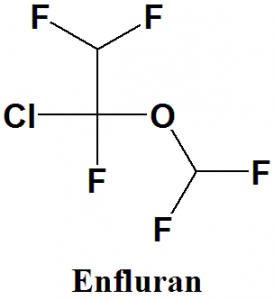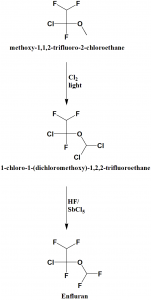ENFLURANE Synthesis, SAR, MCQ, Structure, Chemical Properties and Therapeutic Uses
Enflurane
IUPAC nomenclature
(RS)-2-chloro-1-(difluoromethoxy)-1,1,2-trifluoroethane
Classification
Enflurane is a halogenated inhalational anesthetic.
Physiochemical Properties
| S. NO. | PHYSICAL AND CHEMICAL PROPERTIES | |
| 1 | Molecular weight | 184.49g/mol |
| 2 | Physical appearance | Clear colorless volatile liquid |
| 3 | Boiling point | 56.5°C |
| 4 | Solubility | Solubility in water is poor. |
| 5 | Octanol/water partition coefficient | 2.1 |
| 6 | Presence of ring | Not present |
| 7 | Number of chiral centers | 1 |
Mechanism of Action
- Enflurane produces depressive effects by binding with GABAA and glycin receptors.
- The cardio depressive effect is produced due to binding of the drug with calcium channels.
- Enflurane binds with glycine receptors which results in CNS depression.
Structure Activity Relationship
The SAR for inhaled anesthetics can be summarized as follows:
- Halogenations of the hydrocarbons and ether increases the anesthetic potency.
- Halogenations of the hydrocarbons tends to induce arrhythmia in the following order F<Cl<Br<I.
- Due to presence of asymmetric halogenated carbon in ether, they are better anesthetics.
- Halogenated methyl ethyl ethers are more stable, more potent and have better clinical profile than halogenated diethyl ether.
- Fluorination increases the stability and decreases the flammability.
- Compete halogenations of the alkane or ether decreases the anesthetic potency and increases the convulsant potency
- Presence of double bond increases chemical reactivity and toxicity.
Method of synthesis
i. Free radical chlorination of methoxy-1,1,2-tifluoro-2-chloroethane.
ii. The reaction is followed by halogen exchange in presence of HF or SbCl5 [1]
Therapeutic Uses
Enflurane is used for:
- As an anesthetic agent
Side Effects
Side effects of enflurane are:
- Depression of myocardial contractility
- Decrease in myocardial oxygen consumption
- Malignant hyperthermia
- Nephrotoxicity
- Acute kidney injury
- Kidney failure
MCQs
Q.1 Match the following with correct SAR of the Inhaled anesthetics.
| i. Halogenation of the hydrocarbons | A. Increases the anesthetic potency |
| ii. Fluorination | B. Decreases the anesthetic potency |
| C. Increases the flammability | |
| D. Decreases the Flammability |
a) i-A, ii-C
b) i-A, ii-D
c) i-B, ii-C
d) i-B, ii-D
Q.2 Correct sequence for the True/False for correct IUPAC names of the drug can be?
- Enflurane: (RS)-2-chloro-1-(difluoromethoxy)-1,1,2-trifluoroethane
- Phenobarbitone: N,N-dimethyl-3-[2-(trifluoromethyl)-10H-phenothiazin-10-yl]propan-1-amine.
- Felbamate: 8-Chloro-11-(4-methylpiperazin-1-yl)-5H-dibenzo[b,e][1,4]diazepine
- Esmolol: (9Z)-N,N-dimethyl-9-[3-(4-methylpiperazin-1-yl)propylidene]-9H-thioxanthene-2-sulfonamide.
a) TFFF
b) FTFT
c) TTFT
d) FTTF
Q.3 Correct statement related with the solubility of the drug Enflurane from the following is?
a) Solubility is water is very good
b) Solubility in water is good
c) Solubility in water is poor
d) None of the above
Q.4 Enflurane binds with?
a) GABAA receptors
b) Glycine receptors
c) Both a) and b)
d) None of the above
Q.5 Which amongst the following is a therapeutic use of drug Enflurane?
a) As an anesthetic agent
b) Treatment of manic phase of bipolar disorder
c) Treatment of migraine headaches
d) Treatment of Parkinson diseases
Q.6 Which of the following drug and their classification are correct?
I. Enflurane: Inhalational anesthetics
II. Carbachol: Anti-inflammatory drug
III. Arecoline: Choline ester cholinergic agonist
IV. Pilocarpine: Alkaloid cholinergic agonist
a) I
b) II, IV
c) II, III
d) , I, IV
Q.7 Enflurane can be synthesized by halogen exchange of compound?
a) 1-(dichloromethoxy)-1,2,2-trifluoroethane
b) 1-chloro-1-(dichloromethoxy)-1,2,2-tribromoethane
c) 1-chloro-1-(dichloromethoxy)-1,2,2-triiodoethane
d) 1-chloro-1-(dichloromethoxy)-1,2,2-trifluoroethane
Participate in Online FREE GPAT TEST: CLICK HERE
Participate in Online FREE Pharmacist TEST: CLICK HERE
Participate in Online FREE Drug Inspector TEST: CLICK HERE
ANSWERS
1-b
2-a
3-c
4-c
5-a
6-d
7-d

